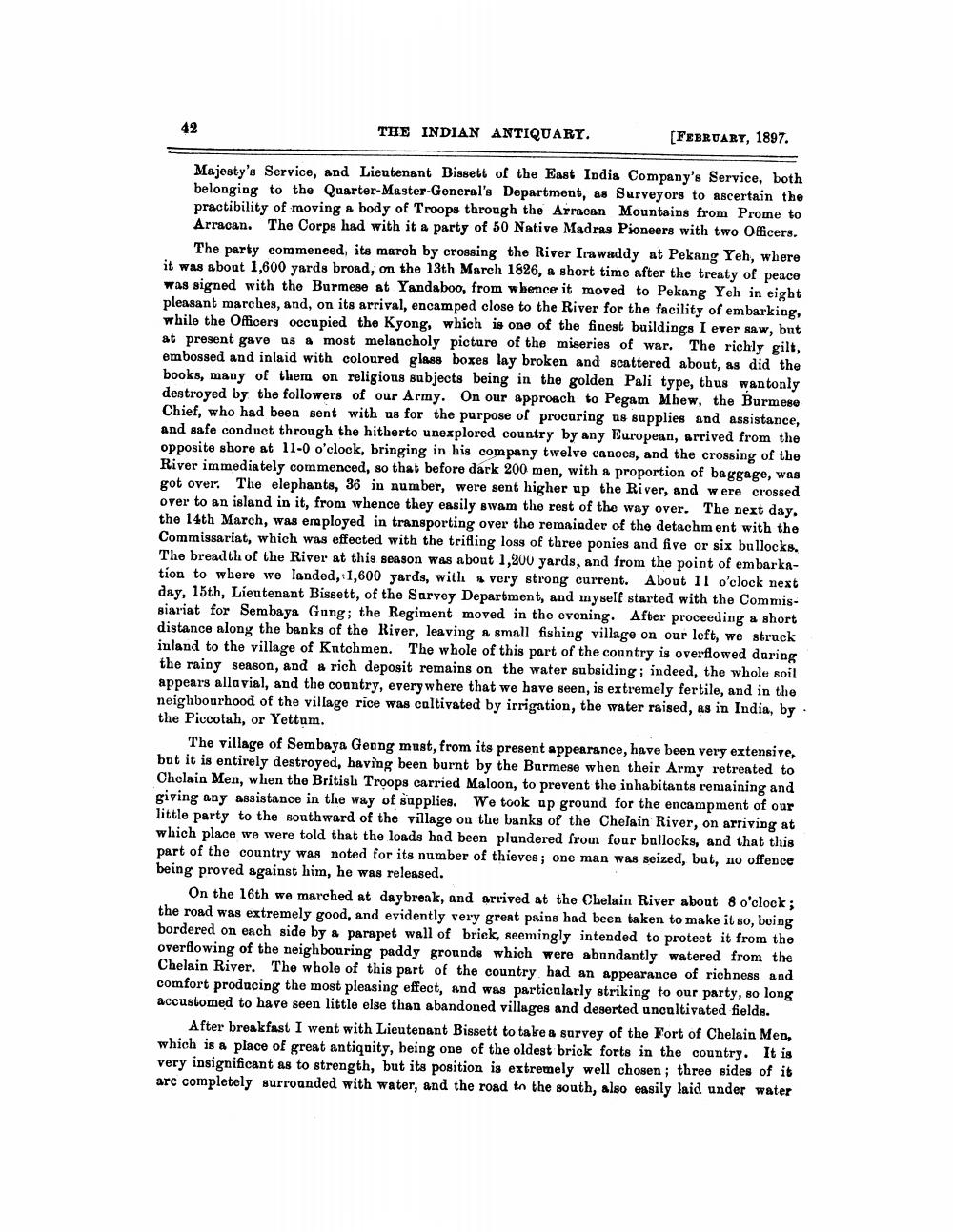________________
THE INDIAN ANTIQUARY.
[FEBRUARY, 1897.
Majesty's Service, and Lieutenant Bissett of the East India Company's Service, both belonging to the Quarter-Master-General's Department, as Surveyors to ascertain the practibility of moving a body of Troops through the Arracan Mountains from Prome to Arracan. The Corps had with it a party of 50 Native Madras Pioneers with two Officers.
The party commenced, its march by crossing the River Irawaddy at Pekang Yeh, where it was about 1,600 yards broad, on the 13th March 1826, a short time after the treaty of peace was signed with the Burmese at Yandaboo, from whence it moved to Pekang Yeh in eight pleasant marches, and, on its arrival, encamped close to the River for the facility of embarking, while the Officers occupied the Kyong, which is one of the finest buildings I ever saw, but at present gave us a most melancholy picture of the miseries of war. The richly gilt, embossed and inlaid with coloured glass boxes lay broken and scattered about, as did the books, many of them on religions subjects being in the golden Pali type, thus wantonly destroyed by the followers of our Army. On our approach to Pegam Mhew, the Burmese Chief, who had been sent with us for the purpose of procuring us supplies and assistance, and safe conduct through the hitherto unexplored country by any European, arrived from the opposite sbore at 11-0 o'clock, bringing in his company twelve canoes, and the crossing of the River immediately commenced, so that before dark 200 men, with a proportion of baggage, was got over. The elephants, 36 in number, were sent higher up the River, and were crossed over to an island in it, from whence they easily swam the rest of the way over. The next day, the 14th March, was employed in transporting over the remainder of the detachment with the Commissariat, which was effected with the trifling loss of three ponies and five or six bullocks. The breadth of the River at this season was about 1,200 yards, and from the point of embarkation to where we landed, 1,600 yards, with a very strong current. About 11 o'clock next day, 15th, Lieutenant Bissett, of the Sarvey Department, and myself started with the Commissiariat for Sembaya Gung; the Regiment moved in the evening. After proceeding a short distance along the banks of the River, leaving a small fishing village on our left, we struck inland to the village of Kutchmen. The whole of this part of the country is overflowed during the rainy season, and a rich deposit remains on the water subsiding; indeed, the whole soil appears alla vial, and the country, every where that we have seen, is extremely fertile, and in the neighbourhood of the village rice was caltivated by irrigation, the water raised, as in India, by. the Piccotah, or Yettum.
The village of Sembaya Geung must, from its present appearance, have been very extensive, but it is entirely destroyed, having been burnt by the Burmese when their Army retreated to Chelain Men, when the British Troops carried Maloon, to prevent the inhabitants remaining and giving any assistance in the way of supplies. We took up ground for the encampment of our little party to the southward of the village on the banks of the Chelain River, on arriving at which place we were told that the loads had been plundered from four ballocks, and that this part of the country was noted for its number of thieves; one man was seized, but, no offence being proved against him, he was released.
On the 16th we marched at daybrenk, and arrived at the Chelain River about 8 o'clock; the road was extremely good, and evidently very great pains had been taken to make it so, boing bordered on each side by a parapet wall of brick, seemingly intended to protect it from the overflowing of the neighbouring paddy grounds which were abundantly watered from the Chelain River. The whole of this part of the country had an appearance of richness and comfort producing the most pleasing effect, and was particularly striking to our party, so long accustomed to have seen little else than abandoned villages and deserted uncultivated fields.
After breakfast I went with Lieutenant Bissett to take a survey of the Fort of Chelain Men, which is a place of great antiquity, being one of the oldest brick forts in the country. It is very insignificant as to strength, but its position is extremely well chosen ; three sides of it are completely surrounded with water, and the road to the south, also easily laid under water




